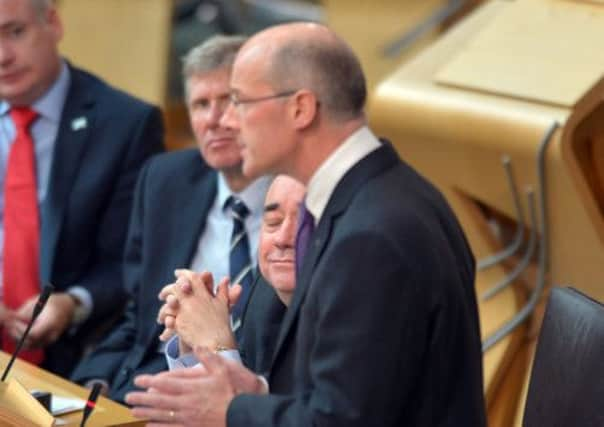Euan McColm: Swinney’s budget won’t win referendum


I’m not sure precisely what Swinney’s aides hoped to achieve by using this expression but the result was that they pulled back the curtain on the politics of his priorities. Each announcement during the statement on how he proposed to budget a £30 billion block grant from the Treasury was, we were entitled to believe, being made with an eye on next September’s independence referendum.
With support for a Yes vote languishing, suggesting the draft budget had been shaped to fit the SNP’s constitutional plans was a reckless thing to do. In the end, Swinney did not use the phrase as he addressed MSPs. He didn’t have to. The clunky spin might have been ditched, but the truth was out. In announcement after announcement, the Finance Secretary made the case for Scotland to break from the rest of the United Kingdom.
Advertisement
Hide AdAdvertisement
Hide AdSupporters will say, well, of course he did. To the true believer in Scottish independence, the Finance Secretary is hamstrung by Westminster and, therefore, it’s his duty to make this point as he explains exactly what he his – and isn’t – spending money on. But to those opposed to, or yet to be convinced by, the arguments for independence, the approach risks appearing cynical.
Swinney’s announcement that £20 million would be provided in the coming year to mitigate against the impact on benefit claimants of the “bedroom tax” might play into the SNP’s narrative that Westminster is defined by a lack of compassion (while Scots are an endlessly caring people) but the language he used, when challenged later by Labour on why he wasn’t doing more, exposed the politics. To invest more in dealing with the impact of benefit cuts would be, he said, to let Westminster “off the hook”, the implication being that there was political capital here and Swinney wasn’t going to squander it by taking all of the necessary action.
Swinney’s remark also missed the point that the Tory-Lib Dem coalition is not on the hook over bedroom tax. It may be an issue that exercises politicians and campaigners but a cap on benefits enjoys overwhelming support, both south of the Border and here in Scotland.
As well as providing – a limited amount – of support to those facing the impact of limits on welfare, Swinney had more good news for the wealthier in society.
He confirmed that the popular freeze on council tax would continue, as would the provision of free prescriptions. These policies are sold as evidence of a government responding to the peculiarly compassionate nature of Scots but, proportionately, they are of greatest benefit to the better off. Free prescriptions were already available for those on benefits before the SNP made them universal and, likewise, so was council tax relief.
Since the SNP’s first Holyrood election victory in 2007, the Finance Secretary has been a crucial figure in the party’s remarkable success story. Swinney is an authoritative political figure, with a reputation for decency and competence. Over time, he has used these gifts to bring to the chamber budgets that contain a common theme: he could do more, much much more, if it wasn’t for the fact that Scotland was being held back by the UK.
This is a perfectly obvious political strategy: it’s in keeping with the SNP’s independence wish, and it removes from Swinney some responsibility for the effectiveness of his plans. If there are flaws, that’s Westminster’s fault, don’t you see?
What we’ve ended up with is a series of reactive budgets; financial plans driven by a desire to illustrate supposedly stark differences in priorities north and south of the Border. Swinney’s spending story tells us more clearly what the Scottish Government is opposed to than what it supports (and, this week, that story also pointedly ignored the fact that Chancellor George Osborne’s spending review of three months ago means the Scottish Government’s capital spending allocation will rise by £296m and that a further £100m will come from the Treasury, under the Barnett Formula).
Advertisement
Hide AdAdvertisement
Hide AdThe reactive approach has been more than adequate these past six years but Wednesday’s was the last draft budget before the referendum and it should surely have contained more detail about what Scotland might be rather than what it opposes. Where was the detailed vision of a flourishing, independent economy? Where was the radicalism, the fairness, and the willingness to take difficult decisions that might reflect the pro-independence campaign’s self-image?
Here’s a mischievous thought: they weren’t there because this was a draft budget from a government that knows when it gets into the detail of how exactly independence might work, its arguments start to show cracks. Better, surely, to stick to those big, bold “we’re different” headlines than to get lost in small print.
The SNP has maintained poll leads over Labour since 2006 by telling us how Scots differ from the English (yes, the English, not the rest of the UK). Voters continue to buy the message, up to a point. The success of the nationalists in elections, running parallel to stagnant support for independence, seems to support the idea that, yes, we are different, but not so different that we don’t want to share a country.
John Swinney is a true believer in Scottish independence. The constitutional settlement is central to his politics and he might well believe he delivered a budget for independence. But with its cautious reliance on tested vote-winning giveaways, it was as much a budget for continued electoral success, regardless of whether the UK breaks up next year or not. «
Twitter: @euanmccolm